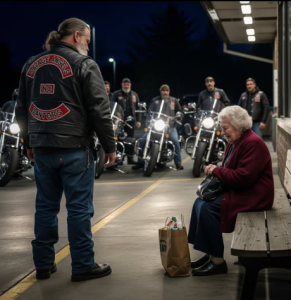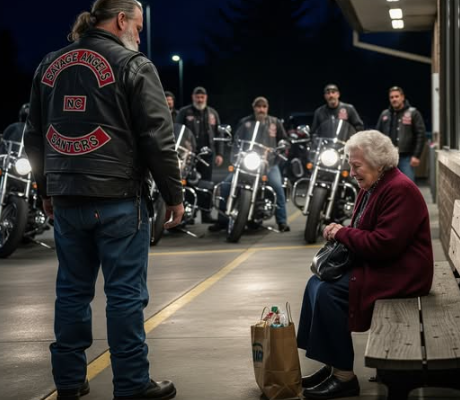The Bench, the Bikers, and Dorothy Chen
The bench was cold. Not just from the wind that swept through the grocery store parking lot, but from the silence that followed the text message. Dorothy Chen sat with her purse clutched tightly, the grocery list still folded in her lap. Her son had written it that morning—eggs, bread, toothpaste. She’d bought what she could with her modest Social Security check. Two small bags. That was all.
But when she stepped outside, Michael’s car was gone.
The message came ten minutes later: “Margaret found a nursing home with an opening. They’ll pick you up tomorrow. It’s time.”
No explanation. No conversation. Just a decision made without her. After eighty-two years of living, loving, and sacrificing, Dorothy had been reduced to a logistical problem.
She stared at her phone, the screen dimming with each passing minute. Her fingers trembled—not from the cold, but from the weight of abandonment. She had raised Michael alone, worked three jobs to put him through college, sold her house to help pay for his wedding. And now, she was a burden.
That’s when the engines roared.
Seven motorcycles pulled into the lot, their presence unmistakable. Leather vests, tattoos, and the kind of thunder that made people turn their heads. Dorothy instinctively shrank into herself, hoping to disappear. But one of them—a towering man with a grey beard that reached his chest—walked straight toward her.
“Ma’am?” he said, voice soft. “You okay? You’ve been sitting here since we went in the store.”
Dorothy hesitated. “I’m… waiting for my ride.”
“In this cold? How long you been waiting?”
She couldn’t answer. The tears came instead.
The man sat beside her. His name was Bear, she would learn later. Around them, the other bikers formed a quiet circle, shielding her from the wind. They didn’t speak. They didn’t pry. They simply waited.
“My son,” she finally whispered. “He left me here. Says I’m going to a nursing home tomorrow.”
Bear’s jaw tightened. “Against your will?”
“Does it matter?” she said. “I’m old. Useless. A burden.”
Bear pulled out his phone. “What’s your son’s name?”
“Why?”
“Because nobody dumps their mother in a parking lot on my watch.”
She told him. Michael Chen. Riverside Drive. The big white house with the Mercedes in the driveway.
One of the younger bikers muttered, “That’s the guy who called the cops on us last month. Said we were disturbing the peace.”
Bear’s eyes darkened. “Is that so?”
Then he turned back to Dorothy. “Ma’am, you hungry? When’s the last time you ate?”
“Toast,” she said. “This morning.”
“Tank,” Bear called out. “Tell Mama Rose we’re bringing a guest for dinner.”
And just like that, Dorothy Chen was no longer alone.
The Savage Angels Motorcycle Club wasn’t what people imagined. Yes, they rode loud bikes. Yes, they wore leather and had nicknames like Tank, Ghost, and Mama Rose. But beneath the surface was something deeper—a code of honor, a fierce loyalty, and a commitment to protect those who couldn’t protect themselves.
Mama Rose’s house was warm, filled with the scent of cornbread and chili. Dorothy was given a seat at the head of the table. No one asked her to explain. No one made her feel small. They simply welcomed her.
Over dinner, Dorothy shared pieces of her life. Her marriage to Harold, a gentle man who’d died of cancer six years earlier. Her decision to marry outside her race in 1963, when love could be dangerous. Her pride in Michael, despite everything.
Bear listened. Not just with his ears, but with his whole presence. And when Dorothy finished, he said, “You’re not going to that nursing home.”
“But where would I go?”
“You’ll stay with Mama Rose for now. We’ll figure out the rest.”
The next morning, Bear and two others rode to Riverside Drive. They didn’t threaten. They didn’t shout. They simply knocked on the door and asked Michael why he thought it was acceptable to abandon his mother.
Michael stammered. Said she was forgetful. Said he couldn’t handle it anymore.
Bear nodded. “Then you should’ve asked for help. Not dumped her like trash.”
Michael didn’t respond.
Dorothy never returned to that house. Instead, she became part of the Savage Angels’ extended family. Mama Rose taught her how to make gumbo. Tank helped her set up a Facebook account. Ghost took her to the farmers market every Saturday.
And Dorothy, in turn, gave them something they hadn’t known they needed—a quiet grace, a listening ear, and stories that reminded them of where they came from.
She became the club’s matriarch. Not by blood, but by bond.
One evening, as the sun dipped low and the bikes lined the driveway like sentinels, Dorothy sat with Bear on the porch.
“Why did you help me?” she asked.
Bear shrugged. “My mom died when I was fifteen. I’d give anything to have her back. When I saw you on that bench… I saw her.”
Dorothy reached for his hand. “You gave me back my dignity.”
Bear smiled. “You gave us something too. You reminded us that family isn’t just who you’re born to—it’s who shows up.”
Dorothy Chen never went to a nursing home. She lived out her days surrounded by people who saw her worth, who honored her story, and who made sure she never sat alone on a bench again.
And in the end, it wasn’t the son who defined her legacy—it was the bikers who took her home.


